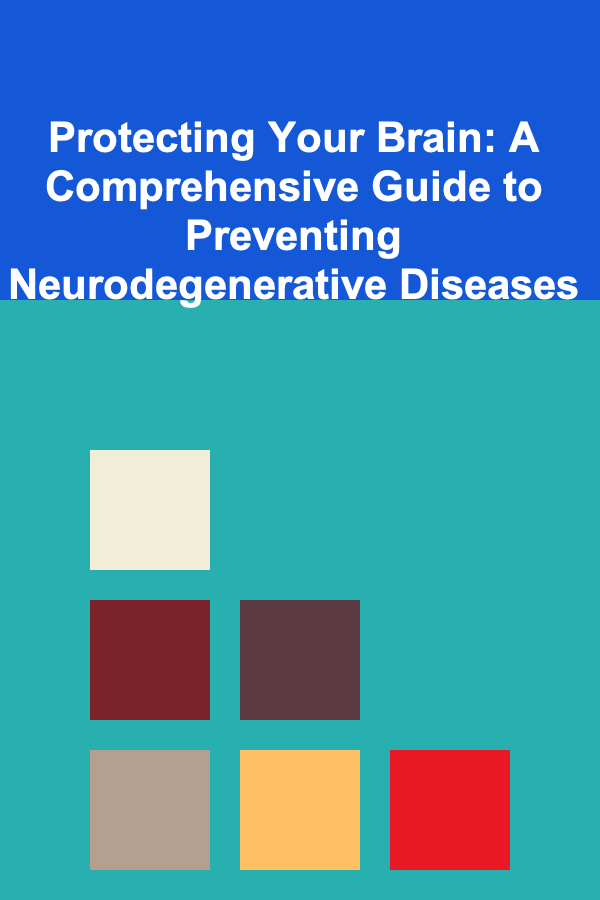
Protecting Your Brain: A Comprehensive Guide to Preventing Neurodegenerative Diseases
ebook include PDF & Audio bundle (Micro Guide)
$12.99$5.99
Limited Time Offer! Order within the next:

Neurodegenerative diseases, such as Alzheimer's disease, Parkinson's disease, Huntington's disease, and amyotrophic lateral sclerosis (ALS), represent a significant global health challenge. These conditions are characterized by the progressive loss of structure and function of neurons, ultimately leading to cognitive and motor impairments. While a definitive cure remains elusive for most neurodegenerative diseases, mounting evidence suggests that proactive lifestyle modifications and preventative strategies can significantly reduce the risk of developing these devastating illnesses and slow their progression in those already affected. This comprehensive guide explores the multifaceted approach to protecting your brain from neurodegenerative diseases, delving into the roles of diet, exercise, cognitive stimulation, sleep, stress management, environmental factors, and emerging therapeutic interventions.
Understanding the Landscape of Neurodegenerative Diseases
Before exploring preventative measures, it's crucial to understand the fundamental aspects of neurodegenerative diseases. These diseases are not a single entity but rather a diverse group of conditions sharing common pathological features, including protein misfolding and aggregation, mitochondrial dysfunction, oxidative stress, inflammation, and excitotoxicity. The specific brain regions affected and the underlying genetic and environmental factors vary depending on the disease.
Alzheimer's Disease
Alzheimer's disease (AD) is the most prevalent neurodegenerative disease, characterized by the progressive decline in cognitive function, particularly memory. Pathologically, AD is defined by the presence of amyloid plaques (formed by the aggregation of amyloid-beta protein) and neurofibrillary tangles (formed by the aggregation of tau protein) in the brain. These abnormal protein deposits disrupt neuronal communication and ultimately lead to cell death. Genetic factors, particularly the APOE4 allele, increase the risk of AD, but lifestyle factors also play a significant role. Early-onset AD is often linked to genetic mutations affecting amyloid precursor protein (APP), presenilin 1 (PSEN1), and presenilin 2 (PSEN2).
Parkinson's Disease
Parkinson's disease (PD) primarily affects motor control, causing tremors, rigidity, bradykinesia (slowness of movement), and postural instability. The hallmark of PD is the loss of dopamine-producing neurons in the substantia nigra, a region of the brain responsible for motor coordination. Alpha-synuclein protein aggregates, known as Lewy bodies, are also found in the brains of individuals with PD. Genetic mutations in genes such as LRRK2, SNCA, PARK2, and PINK1 can increase susceptibility to PD. Environmental toxins, such as pesticides, have also been implicated.
Huntington's Disease
Huntington's disease (HD) is a hereditary neurodegenerative disorder caused by an expanded CAG repeat in the huntingtin (HTT) gene. This mutation leads to the production of an abnormal huntingtin protein, which aggregates in the brain, causing neuronal dysfunction and death. HD is characterized by motor, cognitive, and psychiatric symptoms, including chorea (involuntary movements), cognitive decline, and mood disturbances. The age of onset and severity of symptoms are correlated with the number of CAG repeats.
Amyotrophic Lateral Sclerosis (ALS)
Amyotrophic lateral sclerosis (ALS), also known as Lou Gehrig's disease, is a progressive neurodegenerative disease that affects motor neurons, leading to muscle weakness, paralysis, and ultimately death. Both genetic and environmental factors contribute to the development of ALS. Mutations in genes such as SOD1, TARDBP, FUS, and C9orf72 have been linked to ALS. The underlying mechanisms of ALS are complex and involve oxidative stress, excitotoxicity, protein aggregation, and mitochondrial dysfunction.
Lifestyle Strategies for Brain Protection
The good news is that individuals can take proactive steps to reduce their risk of developing neurodegenerative diseases. Adopting a brain-healthy lifestyle involves a combination of dietary changes, regular exercise, cognitive stimulation, sufficient sleep, and effective stress management.
Dietary Interventions
Diet plays a crucial role in brain health, providing the necessary nutrients for neuronal function and protecting against oxidative stress and inflammation. A brain-healthy diet emphasizes whole, unprocessed foods, rich in antioxidants, vitamins, and minerals.
- Mediterranean Diet: The Mediterranean diet, characterized by a high intake of fruits, vegetables, whole grains, legumes, nuts, seeds, olive oil, and fish, and a low intake of red meat and processed foods, has been consistently associated with a reduced risk of cognitive decline and Alzheimer's disease. The high content of antioxidants and healthy fats in the Mediterranean diet protects against oxidative stress and inflammation, which are key contributors to neurodegeneration. A meta-analysis published in the journal Neurology found that adherence to a Mediterranean diet was associated with a significantly lower risk of developing Alzheimer's disease (Neurology. 2018 Oct 16;91(16):e1579-e1590.).
- Antioxidant-Rich Foods: Antioxidants, such as vitamins C and E, beta-carotene, and flavonoids, protect cells from damage caused by free radicals, which are unstable molecules that contribute to oxidative stress. Foods rich in antioxidants include berries (blueberries, strawberries, raspberries), leafy green vegetables (spinach, kale), nuts, seeds, and green tea. Resveratrol, found in red grapes and red wine (in moderation), is another potent antioxidant with neuroprotective properties.
- Omega-3 Fatty Acids: Omega-3 fatty acids, particularly EPA (eicosapentaenoic acid) and DHA (docosahexaenoic acid), are essential for brain health, supporting neuronal membrane function and reducing inflammation. Good sources of omega-3 fatty acids include fatty fish (salmon, tuna, mackerel), flaxseeds, chia seeds, and walnuts. Studies have shown that higher intakes of omega-3 fatty acids are associated with improved cognitive function and a reduced risk of Alzheimer's disease (J Alzheimers Dis. 2012;32(3):633-42.).
- Limit Saturated and Trans Fats: Saturated and trans fats, commonly found in processed foods, red meat, and fried foods, can increase the risk of heart disease and cognitive decline. These fats promote inflammation and can impair brain function.
- Reduce Sugar and Processed Carbohydrates: High intake of sugar and processed carbohydrates can lead to insulin resistance, which has been linked to an increased risk of Alzheimer's disease. Insulin resistance impairs the brain's ability to utilize glucose, its primary energy source. Focus on complex carbohydrates, such as whole grains, fruits, and vegetables, which are digested more slowly and have a lower glycemic index.
- Consider Intermittent Fasting: Emerging research suggests that intermittent fasting (IF), a dietary pattern that involves cycling between periods of eating and fasting, may have neuroprotective effects. IF can improve insulin sensitivity, reduce inflammation, and promote autophagy, a cellular process that removes damaged proteins and organelles. However, it's crucial to consult with a healthcare professional before starting an IF regimen.
The Power of Exercise
Regular physical exercise is not only beneficial for physical health but also plays a vital role in maintaining brain health and reducing the risk of neurodegenerative diseases. Exercise promotes neurogenesis (the formation of new neurons), improves blood flow to the brain, reduces inflammation, and enhances cognitive function.
- Aerobic Exercise: Aerobic exercise, such as brisk walking, running, swimming, and cycling, increases heart rate and blood flow, delivering more oxygen and nutrients to the brain. Studies have shown that regular aerobic exercise can improve cognitive function, particularly memory and executive function, and reduce the risk of Alzheimer's disease. A study published in the Journal of Alzheimer's Disease found that regular aerobic exercise was associated with increased gray matter volume in brain regions involved in memory and cognitive function (J Alzheimers Dis. 2010;22(2):691-701.).
- Strength Training: Strength training, or resistance training, involves using weights or resistance bands to build muscle strength. While often overlooked, strength training is also beneficial for brain health, improving cognitive function and reducing the risk of falls, which can contribute to brain injury.
- Combination Exercise: A combination of aerobic exercise and strength training may provide the most comprehensive benefits for brain health. This approach improves cardiovascular fitness, muscle strength, and cognitive function.
- Find Activities You Enjoy: The key to maintaining an exercise routine is to find activities that you enjoy. This could include dancing, gardening, hiking, or playing sports. Even moderate activity, such as walking for 30 minutes most days of the week, can have significant benefits for brain health.
Cognitive Stimulation and Lifelong Learning
Keeping the brain active and engaged throughout life is crucial for maintaining cognitive function and reducing the risk of neurodegenerative diseases. Cognitive stimulation involves engaging in activities that challenge the brain, such as reading, learning new skills, playing games, and socializing.
- Engage in Mentally Stimulating Activities: Activities that challenge the brain, such as reading, writing, playing puzzles, learning a new language, or playing a musical instrument, can help maintain cognitive function and build cognitive reserve. Cognitive reserve refers to the brain's ability to compensate for age-related changes and damage.
- Socialize Regularly: Social interaction is essential for cognitive health. Socializing with friends and family provides mental stimulation, reduces stress, and combats feelings of loneliness and isolation, which can negatively impact brain function.
- Continue Learning Throughout Life: Lifelong learning, whether through formal education, online courses, or self-study, keeps the brain active and engaged. Learning new skills and knowledge enhances cognitive reserve and protects against cognitive decline.
- Challenge Your Brain with Games: Brain training games and puzzles, such as Sudoku, crossword puzzles, and memory games, can improve cognitive function, particularly memory and attention. However, it's important to choose games that are challenging and engaging, rather than repetitive and monotonous.
The Importance of Sleep
Adequate sleep is essential for brain health. During sleep, the brain clears out toxins, consolidates memories, and repairs cellular damage. Chronic sleep deprivation can impair cognitive function, increase inflammation, and increase the risk of neurodegenerative diseases.
- Aim for 7-8 Hours of Sleep Per Night: Most adults need 7-8 hours of sleep per night to maintain optimal cognitive function. Establish a regular sleep schedule, going to bed and waking up at the same time each day, even on weekends.
- Create a Relaxing Bedtime Routine: Establish a relaxing bedtime routine to prepare your body and mind for sleep. This could include taking a warm bath, reading a book, listening to calming music, or practicing relaxation techniques.
- Optimize Your Sleep Environment: Ensure that your bedroom is dark, quiet, and cool. Use blackout curtains, earplugs, or a white noise machine to minimize distractions.
- Avoid Caffeine and Alcohol Before Bed: Caffeine and alcohol can interfere with sleep, disrupting sleep cycles and reducing sleep quality. Avoid consuming these substances in the hours leading up to bedtime.
- Address Sleep Disorders: If you have difficulty falling asleep or staying asleep, or if you experience symptoms of sleep disorders such as sleep apnea or restless legs syndrome, consult with a healthcare professional. Treating sleep disorders can significantly improve sleep quality and cognitive function.
Stress Management Techniques
Chronic stress can have detrimental effects on brain health, increasing inflammation, impairing cognitive function, and increasing the risk of neurodegenerative diseases. Effective stress management techniques are essential for protecting the brain from the negative effects of stress.
- Practice Mindfulness and Meditation: Mindfulness and meditation techniques can help reduce stress, improve focus, and promote relaxation. These practices involve focusing on the present moment and accepting thoughts and feelings without judgment. Studies have shown that mindfulness and meditation can reduce stress hormones and improve cognitive function.
- Engage in Relaxation Techniques: Relaxation techniques, such as deep breathing exercises, progressive muscle relaxation, and yoga, can help reduce stress and promote relaxation.
- Spend Time in Nature: Spending time in nature has been shown to reduce stress hormones, improve mood, and enhance cognitive function. Take walks in the park, hike in the mountains, or simply sit and enjoy the scenery.
- Pursue Hobbies and Interests: Engaging in hobbies and interests provides a sense of purpose and accomplishment, reducing stress and improving overall well-being.
- Seek Social Support: Connecting with friends and family provides emotional support and reduces feelings of loneliness and isolation. Talk to a trusted friend, family member, or therapist about your stressors and seek help when needed.
Environmental Factors and Toxins
Exposure to environmental toxins and pollutants can increase the risk of neurodegenerative diseases. Minimizing exposure to these harmful substances is crucial for protecting brain health.
- Limit Exposure to Air Pollution: Air pollution, particularly particulate matter, has been linked to an increased risk of cognitive decline and Alzheimer's disease. Minimize exposure to air pollution by avoiding areas with high traffic, using air purifiers in your home, and wearing a mask when outdoors.
- Avoid Pesticides and Herbicides: Pesticides and herbicides can have neurotoxic effects. Choose organic produce whenever possible and wash fruits and vegetables thoroughly to remove any residue.
- Limit Exposure to Heavy Metals: Heavy metals, such as lead and mercury, can damage the brain. Avoid exposure to lead paint, contaminated water, and certain types of fish that may contain high levels of mercury.
- Quit Smoking: Smoking increases the risk of cognitive decline and Alzheimer's disease. Quitting smoking is one of the best things you can do for your brain health.
- Moderate Alcohol Consumption: Excessive alcohol consumption can damage the brain. If you choose to drink alcohol, do so in moderation.
Emerging Therapeutic Interventions
While lifestyle modifications are crucial for preventing neurodegenerative diseases, ongoing research is exploring new therapeutic interventions that may slow the progression of these conditions and improve outcomes.
- Disease-Modifying Therapies for Alzheimer's Disease: Significant research is focused on developing disease-modifying therapies for Alzheimer's disease that target the underlying pathological processes, such as amyloid plaques and neurofibrillary tangles. Aducanumab and lecanemab are examples of monoclonal antibodies approved by the FDA that target and remove amyloid plaques from the brain, though their efficacy and potential side effects are still under investigation.
- Gene Therapy: Gene therapy holds promise for treating neurodegenerative diseases caused by genetic mutations. This approach involves delivering therapeutic genes into the brain to correct the underlying genetic defect.
- Stem Cell Therapy: Stem cell therapy involves transplanting stem cells into the brain to replace damaged neurons and promote tissue repair. This approach is being investigated for a variety of neurodegenerative diseases, including Parkinson's disease and ALS.
- Immunotherapy: Immunotherapy involves using the body's own immune system to fight neurodegenerative diseases. This approach is being explored for Alzheimer's disease, Parkinson's disease, and other conditions.
- Clinical Trials: Participating in clinical trials is an important way to contribute to research and potentially benefit from new therapeutic interventions. Consult with your healthcare provider to learn more about clinical trials that may be appropriate for you.
Conclusion: A Proactive Approach to Brain Health
Protecting your brain from neurodegenerative diseases requires a proactive and multifaceted approach. By adopting a brain-healthy lifestyle that includes a nutritious diet, regular exercise, cognitive stimulation, sufficient sleep, stress management, and minimizing exposure to environmental toxins, you can significantly reduce your risk of developing these devastating illnesses. While there is no guaranteed way to prevent neurodegenerative diseases, embracing these strategies can empower you to take control of your brain health and improve your overall well-being. Consult with your healthcare provider to discuss your individual risk factors and develop a personalized plan for brain protection. Remember, investing in your brain health today will pay dividends in the years to come.

Building Bridges: How to Source, Screen, and Place Top Talent as a Recruitment Consultant
Read More
How to Build a Checklist for Managing User-Generated Content on Social Media
Read More
How to Create a Vision Board in Your Study Space
Read More
How to Plan for Seasonal Changes in Your Entryway Organization
Read More
How to Reduce Your Waste Generation Significantly
Read More
How to Integrate Goal-Setting Into Your Daily To-Do List
Read MoreOther Products

Building Bridges: How to Source, Screen, and Place Top Talent as a Recruitment Consultant
Read More
How to Build a Checklist for Managing User-Generated Content on Social Media
Read More
How to Create a Vision Board in Your Study Space
Read More
How to Plan for Seasonal Changes in Your Entryway Organization
Read More
How to Reduce Your Waste Generation Significantly
Read More